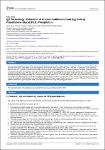IgY Technology: Extraction of Chicken Antibodies from Egg Yolk by Polyethylene Glycol (PEG) Precipitation
Pauly, Diana
Chacana, Pablo A.
Calzado, Esteban G.
Brembs, Björn
Schade, Rüdiger
Hens can be immunized by means of i.m. vaccination (Musculus pectoralis, left and right, injection volume 0.5-1.0 ml) or by means of Gene-Gun plasmid-immunization. Dependent on the immunogenicity of the antigen, high antibody-titres (up to 1:100,000 - 1:1,000,000) can be achieved after only one or 3 - 4 boost immunizations. Normally, a hen lays eggs continuously for about 72 weeks, thereafter the laying capacity decreases. This protocol describes the extraction of total IgY from egg yolk by means of a precipitation procedure (PEG. Polson et al. 1980). The method involves two important steps. The first one is the removal of lipids and the second is the precipitation of total IgY from the supernatant of step one. After dialysis against a buffer (normally PBS) the IgY-extract can be stored at -20°C for more than a year. The purity of the extract is around 80 %, the total IgY per egg varies from 40-80 mg, dependent on the age of the laying hen. The total IgY content increases with the age of the hen from around 40 mg/egg up to 80 mg/egg (concerning PEG precipitation). The laying capacity of a hen per year is around 325 eggs. That means a total potential harvest of 20 g total IgY/year based on a mean IgY content of 60 mg total IgY/egg (see Table 1).
No license information

